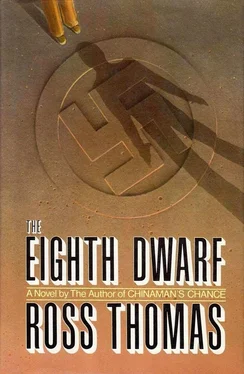Bodden settled himself behind the tree. He wondered if he dared risk a cigarette. He wanted one very much. But no, that would have to wait. Bodden sat, half concealed by the large tree, his throbbing leg stretched straight out in front of him. As he waited and watched, he massaged the knee.
It had been a long walk from the whore’s room in the center of Bonn, and Oppenheimer was sweating a little as he drew near the house where the man who called himself Gloth lived. Oppenheimer had not hurried. Whenever possible, he had kept to side streets, but once or twice it had been necessary to use Koblenzerstrasse. Once a British patrol had passed him in a jeep. The patrol had eyed him carefully, slowed, and then driven on.
During the long walk, Oppenheimer had talked to himself — or rather, to his ironic self. Once when he had sat down to rest and smoke a cigarette, his ironic self had commented on the weather. A nice night for it, no? For what? For murder, of course. An execution will take place, nothing more. Not too long ago you used fancier words than that — words like justice and duty and obligation to the dead. Tell me, do you still think of yourself as an avenging angel? I don’t believe in angels. Come, now, that’s almost what you told the boy — that American Corporal. You can do better for me. Give me some high-flown sentences with something about the dead not having died in vain. I only do what needs doing. You are a fool, aren’t you?
Oppenheimer stopped talking to himself when he reached the high wall. He walked along it until he reached the gate. He paused to study the house. He tried the gate, almost casually, knowing that it would be locked. After studying the house for a few more moments, Oppenheimer walked on.
This is foolish, his ironic self said. Totally foolish. It has to be done. I’ll have no part of it. Then go. You know what will happen if I do? “Let it,” Oppenheimer replied, surprised to find that he had said it aloud.
He threw his briefcase over the wall, then looked around carefully, marking the other streets and houses in his mind. He turned back to the wall. I’m not going. You’ll go. No, not this time. Too bad, Oppenheimer said, or thought he did, and leaped up, just managing to catch the top of the wall with his hands. He hung there for a moment, gathering his strength. All you have to do is let go, drop, and walk away. No, I can’t. Give it up. No, you don’t understand. You never did. There’s nothing else I can do.
Oppenheimer pulled himself slowly up until he could grab the top of the wall with an arm. After that it was easier. He got a leg over and lay on the wall for a moment, waiting to catch his breath. Then he lowered himself over the other side of the wall, hung for a second, and dropped. As he crouched by the wall, he asked, Where are you? He asked it silently, but there was no answer. He asked again, and when there was no reply, he realized that he was alone, really alone. And for the first time since they had dug him out of the rubble in Berlin, he also realized that he was terribly and totally afraid.
From across the street Bodden had watched Oppenheimer scale the wall. That one goes up and over like a monkey, he thought. Nothing quite so agile for you, printer. When you go, you’ll need a stepladder. The bicycle might do. But there’s no hurry. Wait and see what develops. If the one who went over the wall is who you think he is, then it might be better to wait and let him attend to his business first — whatever it may be. Give him a few minutes and then you can go. Smoke a cigarette first and then go crawl over your wall.
Oppenheimer crouched by the wall and checked his Walther pistol. He did it automatically, without thinking. Bent over in a low crouch, he now ran quickly from the wall to some shrubbery, pausing only to give the house a quick look. He would try the door first. It would be locked, but it was always worth a try. Once in — where was it — Stuttgart? No matter. A door had been left open. He tried to remember where it had been, but couldn’t.
Still crouched low, he ran to the house. Then, with his back to its brick, he went slowly sideways toward the door. He moved up the steps and stopped breathing so that he could listen. He heard nothing and began breathing again, slowly and silently through his open mouth.
He put his left hand to the door handle and pressed. It moved. He turned it all the way and slowly shoved the door back. He stopped to listen. Again, there was no sound. He pushed the door open just wide enough for him to slip through. But he didn’t move. Instead, he stopped breathing again so that he could listen, but there was no sound. None at all. He slowly slipped through the door and stopped. Moving sideways with his hand outstretched, he found a wall. He guided himself along the wall until he found a light switch. He didn’t press it, but felt for the door that he knew would be near the switch. Just as he found it, the yellow light came on and the voice said in German, “Don’t move or you’re dead.”
Oppenheimer moved. He whirled and dropped at the same time, firing twice at the yellow light. Then something hard came down on his right wrist, almost smashing it. He could no longer hold the Walther. A hand grabbed his hair and pulled his head back. Something cold and hard pressed up underneath his chin.
“Just one move,” the voice said, “just a twitch, and I pull the trigger.” Oppenheimer didn’t move.
Someone shined the light in his eyes. He closed them.
Another voice said, “He’s fast, isn’t he?”
“I thought he got you.”
“No, I moved just after I switched on the flashlight. I moved very quickly.”
Oppenheimer dimly realized that the voices were speaking English. That wasn’t right. Perhaps he had made a mistake. He wondered if this was the wrong house.
The voice that belonged to whoever was holding the gun underneath his chin said in German, “I want you to get up very slowly.”
Oppenheimer rose. “Now turn around.” Oppenheimer did so. He heard rather than saw some doors being slid open. “Put your hands on your head,” the voice said. After he had done this, the voice told him to walk five paces straight ahead. When he had walked the five paces, the voice told him to turn around. As he turned around, the lights came on. Two men, one of them very little, stood a few feet away from him with pistols aimed at his rib cage. Neither of them was the man who called himself Gloth.
Oppenheimer stared at the little man, the one who was really a dwarf. “You could not be the one who calls himself Gloth, could you?”
“Sorry,” Ploscaru said, shaking his head.
Oppenheimer smiled. “No matter,” he said, and kept on smiling. It was the last thing he would ever say.
“See what he’s got on him,” Ploscaru said. “And don’t forget to look for a knife.”
Jackson moved over to Oppenheimer and went through his pockets. He found some American money, some German marks, a half-smoked package of Lucky Strikes, some matches, a comb, a pencil, and several sheets of ruled paper. There was no knife. Jackson opened the papers and looked at them. They were the sheets that Oppenheimer had torn from Damm’s ledger.
“It’s his people-who-need-killing list,” Jackson said. “You want to know who Gloth really was?”
“Who?”
“Somebody called Dr. Klaus Spalcke — a medical doctor. It says here that his specialty was exploring the pain threshold. He conducted his experiments at several of the camps — there’s a list of them here, if you want me to read it.”
“Not really,” Ploscaru said.
“It says here that his experiments caused the deaths of six thousand four hundred and seventy-one persons. How in hell could they be that exact?”
Читать дальше












